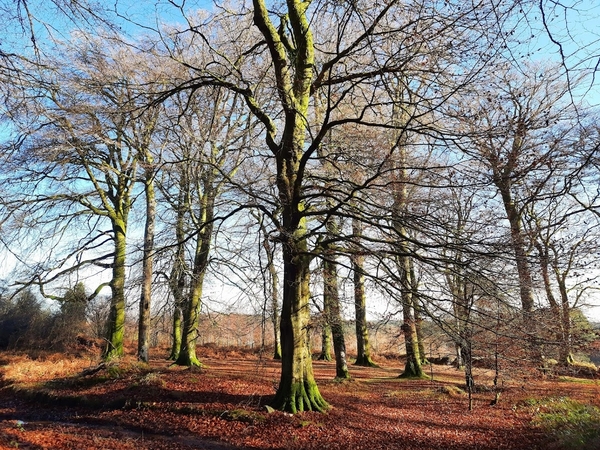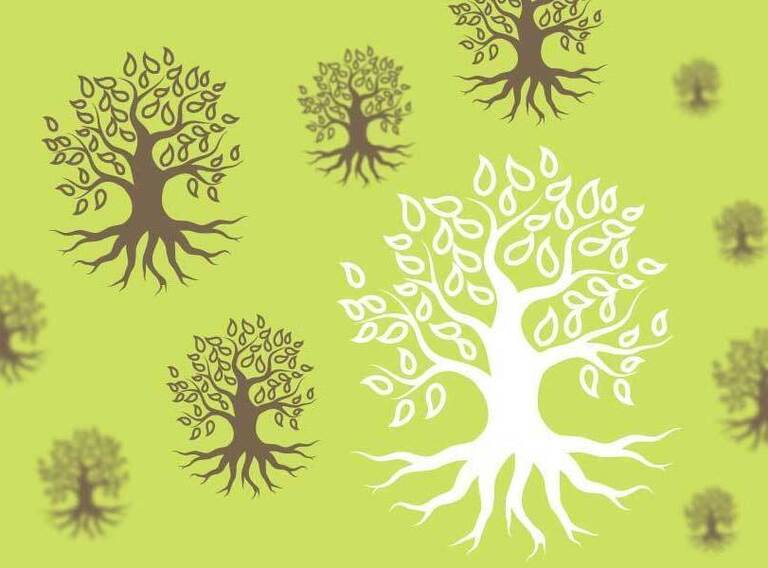Blog

The ecological crisis and Christianity
Tuesday 23rd May 2023
Mike Mullins
“The world we are told was made especially for man – a presumption not supported by the facts. A numerous class of men are painfully astonished wherever they find anything living or dead in all God’s universe that they cannot eat or render in some way what they call useful to themselves.”
John Muir – Christian mystic and naturalist
Where do our beliefs about nature come from?
With the scale of the biodiversity and climate change catastrophe that we are facing it’s clear that we are living in a sick time but also a time of great potential for positive change. It’s very unlikely that more science and technology alone will allow us to reverse humanity’s destruction of nature. At the heart of the ecological crisis we face is a mindset, a spirituality, or lack of one, that we bring to our relationship with nature.
The modern human assumption that trees, plants and all other wildlife are “just property” is, to Richard Powers, the author of "The Overstory" the root of our much greater species problem. “Every form of mental despair and terror and incapacity in modern life seems to be related in some way to this complete alienation from everything else alive. We’re deeply, existentially lonely."
If we are to begin to change our behaviour that is causing the climate and biodiversity crisis we need to understand our beliefs about our relationship with nature and where they come from. What people do to nature depends on how they see and relate to it. Our western relationship with nature is amongst other factors, deeply influenced by the cultural legacy of religion, even though many of us may not now see ourselves as religious.
The gifts of the Christian revolution
It's important to start this exploration of the role of faith in our current ecological crisis with a recognition of the very positive gifts of the Christian faith to our modern mindset, values and way of life. In many ways Christianity’s "victory over paganism" was the greatest psychological revolution in the history of western culture. As the historian Tom Holland argues in his book "Dominion: How the Christian Revolution Remade the World," we may live in a post-Christian world, where the superficial forms of our culture may have ceased to be explicitly Christian but the substance of western culture remains Christian. Concepts such as human rights, equality, compassion and dignity have their origins in Christian thought. The Christian revolution brought about a significant change in power structures. In the Roman world, power was often associated with brute force and domination, while Christianity emphasized humility, forgiveness and service to others. The Christian ethic led to a gradual transformation of political and social institutions, introducing new ideas of leadership and governance. The development of modern legal systems, with their emphasis on justice and fairness, can be traced back to Christian ideas. The concept of equal justice for all, as well as the idea that rulers should be subject to the law, emerged from Christian teachings and influenced the evolution of legal systems. Contrary to the popular notion that Christianity was opposed to science and reason, Holland argues that Christian beliefs laid the foundation for the development of science. Christianity's emphasis on the importance of understanding God's creation and the belief in a rational and ordered universe provided the intellectual framework necessary for scientific inquiry. So, there is much for Christians to be proud of and non Christians to be grateful for in their Christian heritage.
That’s not the whole story though. When it comes to the legacy of one strand of Christian thinking and its impact on our view of and relationship to nature, the story is darker and more disturbing for Christians that care about creation.
Animist reverence for nature
Monotheism evolved with the emergence of agriculture and city living. Before this time, when humans were hunter gatherers, early religions were animistic. With animism every tree, plant, spring, stream, hill and river had a guardian spirit. All of nature was numinous. For example, the pagan Celts viewed the presence of the supernatural as central to and interwoven with, the material world. The Celtic goddesses Boann and Sionnan gave their names to the rivers Boyne and Shannon in Ireland. Tuireann was the Irish god of thunder while Lú was the god of storms. The goddess Brighid was linked to holy wells in Ireland. The Celts revered trees. The bile trees of Ireland were sacred trees, unique to each tribe. Under their canopies Irish tribes would gather for communal rituals, ceremonies, war and peace treaties, to swear oaths and recognise key life transition points. The five sacred bile trees of Ireland were yews, oak and three ash trees. One for each of the five provinces.
The anthropologist David Abram in his poetic book “The spell of the sensuous” argues that the western focus on a transcendent God in heaven resulted in a deep psychological revolution. Prior to monotheism we would have experienced nature as animate. We would have related to all of nature as we do to other sentient beings. Over the last two thousand years we have replaced that innate capacity and way of seeing the world with an objective distance. We've slowly come to regard nature as an object, a resource put there just for our use. Nature as mechanical, prosaic and predictable. There to be mastered and controlled. There has been a shift in how we relate to nature.
Yet by spending time living with indigenous people in Indonesia and Nepal, Abram found he could begin to develop this old indigenous way of seeing the natural world as alive.
“It was from them that I learned the intelligence that lurks in non -human nature… leaving one open to a world all alive, awake and aware. It was from such small beings that my senses first learned of the countless worlds within worlds that spin in the depths of this world that we commonly inhabit, in from them that I learned that my body could, with practise, enter sensorially into these dimensions.”
He found himself experiencing levels of consciousness that he had not explored before. For example, a shaman might talk about a power or presence in the room, referring to a sunbeam coming through window. When Abram looked, he saw a power, an active force, that was changing not just the air with warm currents but the mood of the room. Modern westerners can tend to see separate beings and things, whilst indigenous people with an animist perspective, see animals, plants, other humans, rocks and soils as drenched in a living, inner, sacred energy that draws them into a whole.
Western explorers when they first came across indigenous animists saw them as undeveloped and uncivilised. French anthropologist Lucien Levy-Bruhl though saw indigenous people as just like westerners but using different areas of the brain to interpret and make sense of the world. Neuroscientists now realise that in the west we tend to over rely on the left hemisphere of the brain, where rationalism and pragmatism are based, to relate to nature. Whilst indigenous people tend to rely on a right hemispheric view of the world, the location of a poetic, religious, artistic and musical way of seeing the world. Levy-Bruhl described the mindset of indigenous people as “participative,” not just in their attitude towards other human beings, animals and plants but towards rocks and soil as well. Indigenous people did not experience the power behind the universe and the natural world as a transcendent God, out there, but rather as an intrinsic presence, an immanence. In India, this presence was known as Brahman. In China, the ultimate reality was known as the Dao.
Christianity inadvertently de-sacralised the natural world
Before the dawn of monotheism before you cut down a tree, or dammed a stream, or mined a mountain, you had to honour and placate the spirits, this presence, and keep them placated. Indifferent to the feelings of natural objects, intent on destroying what it saw as heretical, pagan animism, post-Constantinian Christianity inadvertently made it more possible to exploit nature. Man established a monopoly on the spirit world. Christianity ended up de-sacralising the natural world. Turning the earth from a sacred liminal space, where nature was respected and preserved, to soulless animals, inanimate rock, soil and vegetation, put there for our exploitation.
The biblical text of Genesis 1:28 was unfortunately twisted by some Christian thinkers and used to justify man’s domination of and exploitation of nature:
“God blessed them and said to them, “Be fruitful and increase in number; fill the earth and subdue it. Rule over the fish in the sea and the birds in the sky and over every living creature that moves on the ground.”
Christianity made a distinction between man, who is made in the image of God and other than human life.
“Then God said, “Let us make mankind in our image, in our likeness, so that they may rule over the fish in the sea and the birds in the sky, over the livestock and all the wild animals and over all the creatures that move along the ground.”
Genesis 1:26
Whilst the notion of man solely being in the image of God was a very powerful and positive idea laying the foundation for the inherent dignity of all humans and human rights, it effectively reduced the status of nature to an object. An object existing in a patriarchal hierarchy. With God at the top followed by angels, man, other than human life, plants and finally the earth with its rocks, soil and water.
Humanity was made the pinnacle and sole purpose of God’s creation and yet homo sapiens had only existed for 300,000 years in the 4.6-billion-year history of the earth and for much of that time alongside other hominins, like Neanderthals, with whom we interbred and shared most of our DNA. If you reduced the life of earth to 24 hours, homo sapiens would have appeared at 23:59:57 hours, three seconds before midnight. Saying that humanity is the sole concern and purpose of God’s creation in this light, is rather like giving the central character of a film a fleeting walk on part in a film’s end credits. Many see evolution as a purposeful, linear and hierarchical process. In reality its more dendritic, like the growth of a tree with various branches, in which homo sapiens is one leaf on a branch amongst many. This isn't to say humanity isn't loved, adored and rejoiced over by the divine.
To draw upon that great Christian revolutionary St Francis, an alternative way of seeing our relationship with nature and the divine is to see God delighting in the creation of all of life human and other than human life in a confederacy, a partnership, of life rather than a heirarchy. As the medieval Christian mystic Meister Eckhart said,
"God loves all things by becoming all things".
For St Francis God is perhaps calling us to a new and higher level of consciousness. To be part of a loving kinship with the other than human. To use our innate animist capacity to have empathy and compassion for the other than human and not to draw false boundaries based on biological traits that supposedly make us superior to animals.
"Praised be You, my Lord, through Sister Mother Earth,
who sustains us and governs us and who produces
varied fruits with coloured flowers and herbs."
The Canticle of The Sun by St Francis
For St Francis we are part of the family of creation with the other than human. We are called by God to exist in community and partnership, not an exploitative hierarchy.
One particular strain of Western Christianity is then perhaps the world's most anthropocentric religion. In the 2nd century Tertullian and Saint Irenaeus of Lyons argued that when God created Adam, he was foreshadowing the image of the incarnate Christ, the second Adam. Man shared in God's transcendence of nature. This in some way contributed to the dualism of man and nature and allowed man to exploit nature for his own ends.
Christianity’s tradition of asceticism and its disdain for the world, "Contemptus Mundi", the "contempt for the world" and worldly concerns, saw some Christians expressly reject "the world, the Flesh and the devil". Ignoring the fact that Christianity is a faith of incarnation, in which the "word became flesh", making all of creation sacred. The contemplative life was over emphasised as of paramount and of lasting value, despite the example of Jesus's life of contemplation, balanced with compassionate action. Whilst the world was seen as an empty shell, a vanity. An obsession with the salvation of human souls after death in many ways exacerbated this downgrading of nature. Making it all the easier to cut down, burn, extract and exploit nature without any thought for its intrinsic God given, God drenched worth, or for the needs of future generations.
Not every strand of Christian thought led to the separation of God, man and nature. St Thomas Aquinas (1225 – 1274) argued that God was not confined to a supernatural heaven but was present everywhere, in everything. God was not a being but “being itself.” God was all that is. As the saying goes, asking “where is God is, is like the wave asking where the ocean is.”
Thomist theology, though, was overtaken by a radical change in the western notion of the divine in the 14th Century. Influenced by the study of Aristotelian science, logic and mathematics, scholars tried to describe theological issues in rational terms. John Duns Scotus (1265-1308) was one of the first to develop an almost scientific, rational theology.
The philosopher Francis Bacon (1561 - 1626) was the first to develop an empirical philosophy. He argued that you could discover the laws of the universe by investigating the phenomena of nature. For Bacon, God had given Adam clear instructions to fill the earth and conquer it. Adam’s disobedience had thwarted that plan. Now philosophy and science could repair the damage caused by the fall. Human beings could break with the pagan reverence for nature and instead control and subdue nature. Nature was no longer a revelation of God but rather a commodity to be exploited.
Isaac Newton (1642-1727) believed that matter was without life and was inert, unable to move unless acted upon by an external force. In Newton’s theology God was just a physical phenomenon. Newton defined God's essence as “dominatio,” domination, which he identified as gravity. He was scathing about awe and mystery, describing those feelings as superstitious. Newton's theology remained influential in western thought.
"We're wired to wonder what the meaning is. But it's hard to push meaning onto the natural world. We're not only constrained by what we know but by what we can bear"
Mary Barsony, SETI Institute
To be fair though these strands of Christian thought haven't been alone in contributing to a way of thinking that has caused our current environmental crisis. The enlightenment with its emphasis on objectivity, science and the desire to tame and harness nature and then the industrial revolution , humanism and the rise of consumerism have also been major contributors. Each with its emphasis on human exceptionalism contributed to an even greater spiritual alienation from nature and our true, humble, place as human animals in the earth, our mother who has given birth to us.
All these movements and their accompanying paradigms have given us in the west, a particularly “arrogant eye” in our relationship with the earth. An “arrogant eye” that allows us to despoil the earth, so contributing to the environmental catastrophe that we are now experiencing.
Rediscovering the Christian mystical tradition is key to re-sacralising nature
Surely though if one strand of Christian thought has been so much at fault for our ecological crisis it must be a critical part of the solution? As we said at the beginning of this essay the environmental crisis is at heart a spiritual crisis. The antidote to our “arrogant eye” is humility and affiliation. We need to relearn a new Christian spirituality and humility that shifts us away from our anthropocentrism and human exceptionalism and reconnect ourselves to the sacredness of the earth and all other than human life with a deep sense of empathy and affiliation. We have listened to the wrong stories for too long. But mother earth, God’s body, is calling us home. As the Jesuit Teilhard de Chardin said,
“The fate of mankind as well of religion depends on the emergence of a new faith in the future. Armed with such a faith we might find it possible to re sanctify the earth.”
What we do about the biodiversity and climate change crisis depends on our ideas of the human-nature relationship. More science and more technology, whilst important, are not alone going to get us out of the present existential crisis until we rethink, reimagine, re embody the Christian faith and by extension secular humanism which likewise teaches the illusion of human exceptionalism.
This is going to require effort, imagination and empathy. It's critical that we venerate nature, not just when we feel like it but all the time. So religious, spiritual practises and rituals from our Christian tradition, other faiths and indigenous spiritualities, are going to be critical in helping us develop and grow into this new mindset and way of behaving as David Abram learned.
The good news is that there are rich traditions and practises in our Christian faith that can teach us that new spirituality, humility and affiliation and help us to reconnect to the divine in nature. In my next blog I will explore the often forgotten traditions of Christian mysticism that we can draw upon to help us re sanctify and so preserve the earth and all other than human life. In particular the creation spirituality of Celtic Christianity, Hildegard of Bingen, Saint Francis, Meister Eckhart and John Muir.
"How to be animal" Melanie Challenger
"The historical roots of our ecologic crisis" Lynn White Jr
"Dominion: How the Christian revolution remade the world" Tom Holland
"Sacred Nature" Karen Armstrong
"Sacred earth sacred soul" John Philip Newell



